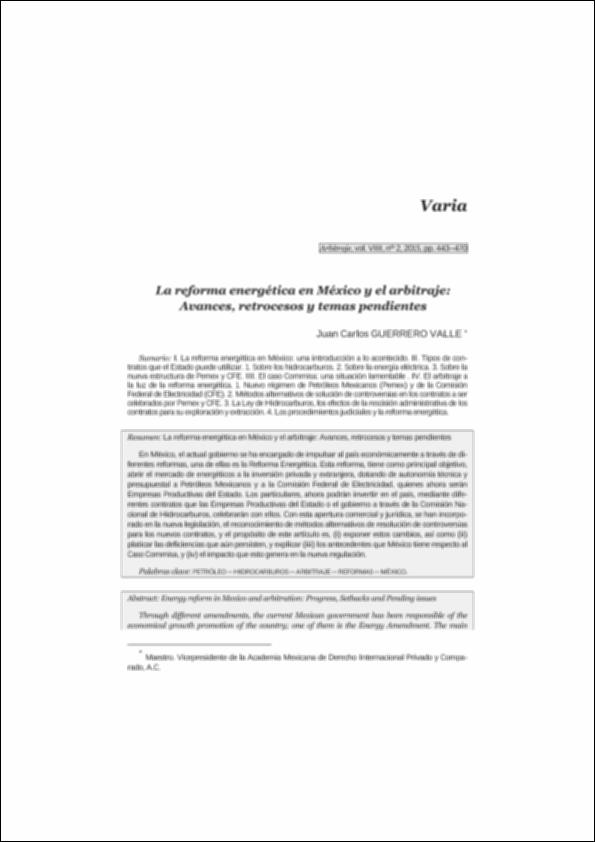Por favor, use este identificador para citar o enlazar este ítem:
http://hdl.handle.net/10637/12642La reforma energética en México y el arbitraje : avances, retrocesos y temas pendientes.
| Título : | La reforma energética en México y el arbitraje : avances, retrocesos y temas pendientes. |
| Autor : | Guerrero Valle, Juan Carlos |
| Materias: | Petróleo; Hidrocarburos; Arbitraje; Reformas; México; Oil; Hydrocarbons; Arbitration; Amendments |
| Resumen : | En México, el actual gobierno se ha encargado de impulsar al país económicamente a través de diferentes reformas, una de ellas es la Reforma Energética. Esta reforma, tiene como principal objetivo,
abrir el mercado de energéticos a la inversión privada y extranjera, dotando de autonomía técnica y
presupuestal a Petróleos Mexicanos y a la Comisión Federal de Electricidad, quienes ahora serán
Empresas Productivas del Estado. Los particulares, ahora podrán invertir en el país, mediante diferentes contratos que las Empresas Productivas del Estado o el gobierno a través de la Comisión Nacional de Hidrocarburos, celebrarán con ellos. Con esta apertura comercial y jurídica, se han incorporado en la nueva legislación, el reconocimiento de métodos alternativos de resolución de controversias
para los nuevos contratos, y el propósito de este artículo es, (i) exponer estos cambios, así como (ii)
platicar las deficiencias que aún persisten, y explicar (iii) los antecedentes que México tiene respecto al
Caso Commisa, y (iv) el impacto que esto genera en la nueva regulación. Through different amendments, the current Mexican government has been responsible of the economical growth promotion of the country; one of them is the Energy Amendment. The main objective of this amendment is to open the energy market to the private and foreign investment, providing technical and budgetary autonomy to PEMEX and to the Federal Commission of Electricity, which now will be “Empresas Productivas del Estado”. Particulars are now able to invest in the country, by different contracts agreed between them and the productive enterprises of the State or the government through the Hydrocarbons National Commission. With this commercial and legal opening the recognition of alternative Dispute Resolution (ADR) for new contracts, has been incorporated to a new legislation, so the purpose of this article is to: I) comment the above mentioned changes as well as II) to discuss about the weaknesses that still persist, and to explain III) the background Mexico has regarding to the Comissa case and IV) the impact that this generates on the new regulation. |
| Descripción : | En: Arbitraje: revista de arbitraje comercial y de inversiones. eISSN. 2603-9281. vol. 8, n. 2, 2015, pp 443-470 |
| URI : | http://hdl.handle.net/10637/12642 |
| Derechos: | http://creativecommons.org/licenses/by-nc-nd/4.0/deed.es |
| Fecha de publicación : | 1-sep-2015 |
| Aparece en las colecciones: | 2015 Arbitraje nº 2 |
Los ítems de DSpace están protegidos por copyright, con todos los derechos reservados, a menos que se indique lo contrario.


